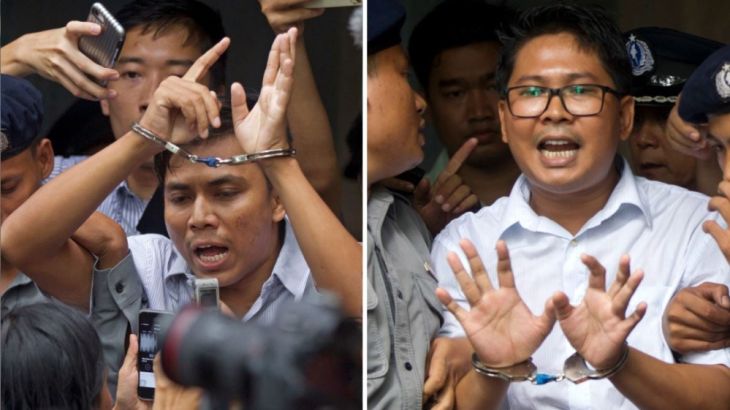Myanmar court rejects final appeal by jailed Reuters journalists
Wa Lone and Kyaw Soe Oo were arrested in 2017 while investigating killing of 10 Rohingya.

Myanmar’s Supreme Court has rejected the appeal of two Reuters news agency reporters sentenced to seven years in jail for breaking the Official Secrets Act, in a landmark case that has raised questions about the country’s transition to democracy.
Wa Lone, 33, and Kyaw Soe Oo, 29, have spent more than 16 months in detention since they were arrested in December 2017 while working on an investigation into the killing of 10 Rohingya Muslim men and boys.
Keep reading
list of 4 itemsLawmakers brawl as Georgian Parliament considers ‘foreign agent’ bill
Journalist loses foot after being badly wounded in Israeli attack in Gaza
Press freedom group says representative denied entry to Hong Kong
“They were sentenced for seven years and this decision stands, and the appeal is rejected,” Supreme Court Justice Soe Naing told the court in the capital, Naypyitaw, on Tuesday without elaborating.
Lawyers for the reporters had appealed to the court citing lack of proof of a crime and evidence that the pair were set up by police.
The investigation that the journalists were working on, which uncovered security forces’ involvement in killings, arson and looting, was completed by colleagues and published in 2018.
Earlier this month, Wa Lone and Kyaw Soe Oo shared with their colleagues the Pulitzer Prize for international reporting, one of journalism’s highest honours.
|
|
A policeman told a lower court last year that officers had planted secret documents on the two reporters.
A district court judge in Myanmar’s largest city, Yangon, found the two journalists guilty under the Official Secrets Act last September and sentenced them to seven years in prison.
The Yangon High Court rejected an earlier appeal in January.
“Wa Lone and Kyaw Soe Oo did not commit any crime, nor was there any proof that they did,” Gail Gove, Reuters chief counsel, said in a statement after the ruling.
“Instead, they were victims of a police setup to silence their truthful reporting. We will continue to do all we can to free them as soon as possible.”
Desperately sad, but still so, so strong. Pan Ei Mon and Chit Su Win speak after Myanmar’s Supreme Court rejected the last appeal to free their husbands, jailed reporters Wa Lone and Kyaw Soe Oo. The fight goes on. #FreeWaLoneKyawSoeOo #JournalismIsNotACrime pic.twitter.com/NsRDueeYcb
— Matthew Tostevin (@TostevinM) April 23, 2019
The reporters’ imprisonment has sparked an outcry from press freedom advocates, Western diplomats, and world leaders, adding to pressure on Myanmar leader Aung San Suu Kyi, the Nobel laureate who took power in 2016 amid a transition to military rule.
Their nine-month trial was roundly condemned as a sham aimed at stifling independent reporting on the military’s large-scale killings of Rohingya.
“Journalists have got the message that they should avoid these kinds of issues,” Myint Kyaw, secretary of the Myanmar Journalists Network, told Al Jazeera.